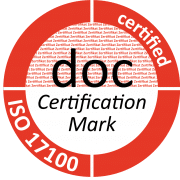How to evaluate English levels for business
You want to know how good your English is? So do we! But we’re not just interested in your level of language proficiency. Knowing your expectations, goals, role in the company and language level helps our trainers to target the session at your needs and to equip you with easily applicable skills that translate to your day-to-day responsibilities. So, how does a language evaluation work?
Photo credit: Sander Crombach
Why do we conduct evaluations with all new students?
The short answer is that evaluations help us provide a better service to you and your team. However, there are four more specific reasons why we like to meet attendees before the first session.
1. Consistent language levels across the group
Getting to know participants ahead of time is particularly relevant for group courses. We want to make sure that the group has a homogenous language level. This prevents some participants being under-challenged and others being overwhelmed. Consistency in language proficiency ensures the lesson material can be chosen appropriately.
2. Creating groups by goals and topics
Matching individual learners to form a group goes beyond English skills. The requirements of people’s roles in the company are another important factor. It makes a huge difference whether someone needs to learn industry-specific vocabulary and business phrases in a short space of time or wants to practise small talk and keep their speaking skills active over a longer timeframe. Meeting the expectations of these two participants would be impossible if they were in the same group – even at the same language level.
3. Choose the perfect trainer
Choosing the right trainer is as important as the composition of the group. We know that the character, teaching style and experience of the trainer are vital to the success of the course. In getting to know the participants a little, we are better able to match them with a trainer. Do they need a more traditional or innovative teaching style? Is the professional background of the trainer important? Is British or American English more relevant?
4. Create a briefing for the trainer
Finally, we use the evaluations to give our trainers a comprehensive briefing before the course starts. They’re given information about the level of the group, the general needs of the participants and any relevant comments about their motivation or previous history learning English. This allows them to go into the first lesson with a level-appropriate plan and build rapport with the group.
An additional bonus is that we are aware of participants’ scheduling requirements and therefore support HR in finding an appointment which works for everyone.
What happens during a language evaluation at EnglishBusiness?
We schedule a 20–30-minute call with each participant. These days we prefer to set up a video call, but pre-Covid we would often come to your office to do the talks in person or simply conduct them over the phone. The evaluation is held by a native speaker – either one of the EnglishBusiness team, or the trainer who will be teaching the course (if we’ve already chosen someone).
Some people are nervous at the start of the evaluation, but there is no need to be. For the participant, the evaluation is a short conversation in English – we just want to you speak 😊 We’ll ask some questions about your job and responsibilities, your needs and expectations of the course, and some more general questions, perhaps about your hobbies or hometown. The evaluator will take some notes and pay attention to any difficulties in understanding, grammar mistakes and general fluency in order to assign a level at the end.
What levelling system to use for English proficiency
We use the CEFR (Common European Framework Reference) as a basis. The CEFR organises language proficiency in six levels, A1 to C2, which can be regrouped into three broad levels:
- Basic User
- Independent User
- Proficient User
We at EnglishBusiness further break each of the six bands into three sub-levels for more accuracy.
Our language evaluations focus on the speaking and listening comprehension level. Should we need a more thorough analysis of written comprehension, we would need to add an extra element. However, we’ve found that for the purposes of corporate language courses and seminars, a written assessment is usually not necessary. Most of our clients want support in improving their spoken English, rather than written accuracy.
Do we conduct evaluations for all your courses?
We evaluate the English levels for all weekly group courses and single classes. However, there is no evaluation for our CompactMINIs as the short, interactive nature of these seminars allows everyone to gain fluency practice even with varying levels of proficiency.
Our communication skills seminars also require an evaluation. However, these only confirm whether the minimum English level of B2 is achieved and focus on more detailed questions about the participants’ expectations and any specific challenges relating to the type of seminar booked.
For example, if an international presentation skills seminar has been booked, we’ll ask about the participant’s experience of presenting in general, where they feel their strengths and weaknesses lie, whether their presentations are to native or non-native speakers, whether they’ve attended a presentations seminar before (in German or English), etc.
We are also able to give the participant information about the format of the seminar and answer any open questions they might have.
How can I get my English levels evaluated?
If you book a course or seminar with EnglishBusiness, the evaluation is included. Of course, evaluations can also be booked independently. The best way forward is to contact us for a consultation and we will find the best solution for you and your team!
















